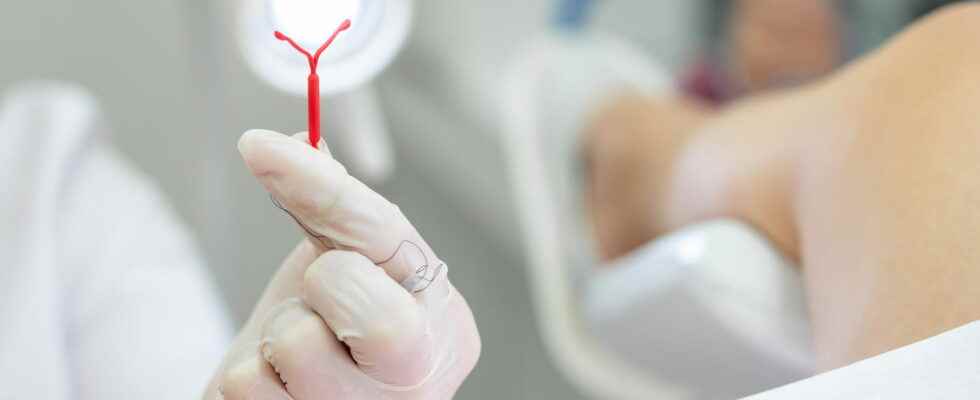IUDs with hormone (Mirena®, Jaydess®, Kyleena®…) could increase the risk of depression or depressed mood, ANSM warns. Women who wear them should watch out for certain symptoms.
Wearing a hormonal IUD (levonorgestrel IUD) could be associated with a risk of depression or depressed moodreports theMedicines Agency (ANSM) in a statement dated February 14, 2023, citing the GIS Epi-Phare study studying the consumption of psychotropic drugs (antidepressants, anxiolytics and hypnotics) in the 2 years following the insertion of the IUD. List of affected models, warning symptoms and procedure for women who wear them.
Which IUDs are affected by this risk?
All the Hormonal IUDs (or hormonal IUDs) contain levonorgestrel and are therefore potentially affected by this risk. A hormonal IUD locally releases levonorgestrel, a synthetic progestogen hormone that thickens cervical mucus between vagina and uterus. It is in particular this thickening which blocks the passage of spermatozoa and provides contraception. It is a drug. And like any drug, it is associated with side effects. Here are the hormonal IUDs marketed in France:
| Levonorgestrel IUD | Dosage | Indication | Maximum exposure time |
|---|---|---|---|
| Mirena® | 52mg | For functional menorrhagia For birth control | 5 years 8 years |
| Donasert® | 52mg | For functional menorrhagia For birth control | 3 years 6 years |
| Kyleena® | 19.5mg | For birth control | 5 years |
| Jaydess® | 13.5mg | For birth control | 3 years |
NB: the 52 mg levonorgestrel IUD is the only hormonal IUD whose indications are not only contraceptive; it is also indicated in the event of excessively heavy periods such as during a endometriosis For example.
What is the risk of depression with hormonal IUDs?
The results of this epidemiological study show that women carrying an IUD with a higher dosage of levonorgestrel (52 mg) a very slightly increased risk of using antidepressants within 2 years of IUD insertion compared to an IUD with a lower progestin dose. On the other hand, the study did not show an increase in the use anxiolytics or hypnotics. This study is the first one to show a risk of depressive disorders depending on the dose of levonorgestrel contained in the IUD. Nevertheless, this risk seems low and remains to be clarified with other complementary studies.
What is the risk of depression with a Mirena IUD?
The risk of depression or depressed mood exists with Mirena® IUDs, although the study could not quantify this risk. It appears like weak.
What is the risk of depression with a Jaydess IUD?
As with Mirena® IUDs, the risk of depression or depressed mood exists with Jaydess® IUDs, although the study could not quantify this risk. This risk appears lower in women with a Jaydess® IUD (IUD with less hormone dose: 13.5 mg) than for women carrying an IUD with a higher progestogen dose such as Mirena® (52 mg).
What is the risk of depression with a Kyleena IUD?
Kyleena® hormonal IUDs have the potential side effect of developing depressive disorders. Nevertheless, women with a Kyleena® IUD would have a very slightly reduced risk of using antidepressants within 2 years of IUD insertion compared to an IUD with a higher progestogen dose such as Mirena® (52 mg).
What are the warning symptoms?
IUDs with hormones may be associated with adverse effects, but it is not systematic, reassures the ANSM. The most frequently observed side effects are:
- Fever
- Severe headaches or migraines with blurred vision
- Mood change or depression
- Unusual vaginal discharge
- Intense or persistent pain in the lower abdomen
- Painful intercourse
- Persistent bleeding outside the rules.
What is the procedure for women?
In the event of mood changes and the occurrence of depressive symptoms, including at the start of treatment:
► Women are advised to contact their general practitioner, gynecologist, midwife, or pharmacist.
► If the situation justifies it, they can consider, with their doctor, an alternative to their current contraception (Copper IUD for example).
► An IUD with hormone requires specific medical monitoring : a medical check-up must be carried out 4 to 6 weeks after installationThen once a year, or more frequently if necessary. The patient card given at the time of insertion makes it possible to record the date of insertion and the deadline for removal of the IUD, indicated by the healthcare professional. It must be brought to each consultation.
Sources: IUDs containing the most hormone present a greater risk of depressive disorders, ANSM, February 14, 2023 / GIS Epi-Phare study conducted on health insurance reimbursement data (SNDS) and published in the Journal of the American Medical Association (JAMA)
